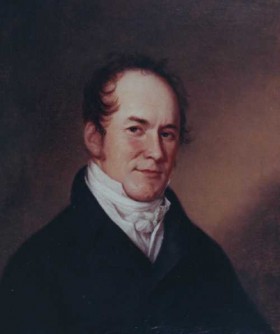John Holmes (1773-1843) was a Representative from Massachusetts and a Senator from Maine; born in Kingston, Massachusetts, March 14, 1773.
He attended the Kingston public schools; graduated from Rhode Island College (now Brown University), Providence, Rhode Island, in 1796. He studied law, was admitted to the bar in 1799, and commenced practice in Alfred, Maine (then a District of Massachusetts) and also engaged in literary pursuits.
The Maine Historic Preservation Commission notes,
Being virtually penniless and seeking fertile ground for his talents he moved to Alfred in the District of Maine in 1799. There was at the time much litigation over land titles in the area and young Holmes, being at first the only lawyer in the town, was handsomely retained by wealthy landowners to dispossess squatters on their land. He was apparently an effective -courtroom advocate but was much given to scathing sarcasm which sometimes prejudiced the court against him.
William Willis says this of him “He handled the weapons of wit with more skill and effect than those of severe logic, although he was not deficient in that prime quality of a sound jurist.”
His political career began in 1802 when as a Federalist, he was representative from Sanford and Alfred. He was reelected the following year and from this point on his main interest turned to politics and away from the practice of law.*
Holmes was elected to the Massachusetts General Court in 1802, 1803, and 1812, and was elected to the State Senate in 1813 and 1814. He was one of the commissioners under the treaty of Ghent to divide the islands of Passamaquoddy Bay between the United States and Great Britain 1816.
The mansion now known as the Senator John Holmes House was erected in 1820 in Alfred. The fifteen room structure was built around an enclosed court.
Elected from Massachusetts to the Fifteenth and Sixteenth Congresses, he served from March 4, 1817, to March 15, 1820, when he resigned. He was Chairman of the Committee on Expenditures in the Department of State (Sixteenth Congress) and delegate to the Maine constitutional convention.
Upon separation from Massachusetts and the admission of the State of Maine into the Union, Holmes was elected to the United States Senate from Maine and served from June 13, 1820, to March 3, 1827. Again elected to the United States Senate to fill the vacancy caused by the resignation of Albion K. Parris, he served from January 15, 1829, to March 3, 1833 holding the position of Chairman of the Committee on Finance (Seventeenth Congress), and member of Committee on Pensions (Twenty-first Congress). [Years of Service: 1820-1823; 1823-1825; 1825-1827; 1829-1829; 1829-1833; Party: Republican; Crawford Republican; Adams; Adams; Anti-Jackson.]
Back in Maine, he resumed his law practice; became a member of the Maine House of Representatives(1836-1837).
His final public service was his appointment by President Harrison in 1841 as United States District Attorney for Maine, which position he retained until his death. He was continuously active in promoting the interests- of fellow citizens in Alfred and was instrumental in bringing all county court sittings to the town in 1833.
His first wife, Sarah Brooks of Scituate, Massachusetts, whom he married in 1800, bore him all his children, two boys and two girls. After her death he married in 1837 the widow of James Swan who was the daughter of Revolutionary hero, General Henry Knox. Following this marriage, Holmes moved to his wife’s home in Thomaston and after his appointment as District Attorney divided his time between there and Portland.*
John Holmes died in Portland July 7, 1843 and is interred in the private tomb of Cotton Brooks, in Portland’s Eastern Cemetery.
Additional Resources
John Holmes Congressional Biography: https://bioguideretro.congress.gov/Home/MemberDetails?memIndex=h000739
*See reference for Senator John Holmes House in Alfred.
Holmes, John. The Statesman, or Principles of Legislation and Law. Augusta, ME: Severance & Dorr, Printers, 1840.
Sulpicius, [pseud.] Examination of the Decision of the Commissioners under the Fourth Article of the Treaty of Ghent, with an appendix of official documents. Portland, Me. Printed at the Argus office, by Thomas Todd. 1829. (Cataloger Note: “Originally published in the Eastern Argus.”–Preface. A criticism of the northeastern boundary settlement under the treaty. Richard H. Shoemaker in his Checklist of American Imprints for 1829 attributes the pamphlet to Ashur Ware, editor of the Eastern Argus, a paper engaged in promoting the separation of Maine from Massachusetts.


